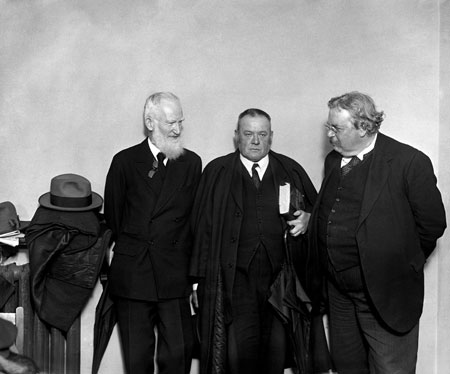G K Chesterton ‘breaks mould of conventional holiness’, says Cause investigator
The priest investigating whether G K Chesterton’s Cause should be opened has hailed the writer as “potentially a huge model” for the Church who “breaks the mould of conventional holiness”.
Fr John Udris said Chesterton, a married layman who “liked his beer and Burgundy”, was not conventionally devout and could show Catholics “you don’t have to say your rosary every five minutes to be holy”.
Instead, Fr Udris suggested, Chesterton’s holiness could be found in his humour, his charity and his humility. His defence of the faith in particular, Fr Udris said, was a model for Catholics.
“People he would have fierce public debates with felt respected by him, loved by him, even if they didn’t agree with him,” he said, citing his exchanges with atheist opponents H G Wells and George Bernard Shaw.
Fr Udris was appointed by Bishop Peter Doyle of Northampton last September to investigate the possibility of opening Chesterton’s Cause.
The appointment came after it emerged that Pope Francis had been a member of the Chesterton Society in Argentina and had approved a prayer for his beatification.
Fr Udris, now spiritual director at St Mary’s seminary in Oscott, Birmingham, used to be parish priest at Beaconsfield, Buckinghamshire, where Chesterton died in 1936.
He said he expected to submit a dossier to Bishop Peter Doyle after a year or more of investigation. He said it would not be up to him to recommend whether to open the Cause, but added that “it will probably be obvious where I stand”.
Fr Udris said the bishop knew he had a personal devotion to Chesterton: “That’s part of the reason he asked me to do it – he wanted me to put some energy behind it.”
He said he would seek to do the job as rigorously as he could because even if the Cause was not opened soon “it might go somewhere in 30, 40 or 50 years from now”.
The “most significant obstacle” to Chesterton’s Cause, he said, was the allegation of anti-Semitism. Chesterton said some “daft things”, including a suggestion that Jewish people should wear distinctive dress to indicate they were outsiders.
Fr Udris said: “You can understand why people make the assumption that he is anti-Semitic. But I would want to make the opposite case.” He added, though, that he had “plenty of reading still to do”.
He explained that the “vast majority” of emails he had received had come from people who “have said they owe becoming a Catholic to Chesterton”.
A woman from Spain wrote to him explaining that she had asked for Chesterton’s prayers to help her have a child. “The connection was that [Chesterton and his wife Frances] didn’t have children, so he would sympathise.”
Fr Udris said he referred to Chesterton himself in terms of gratitude. “His whole way of approaching life was to say thank you.” He would say grace not just before meals but before opening a book or seeing a play, Fr Udris explained. “So my devotion to him would be asking his prayers that I might have that kind of respect.”
Fr Udris also said Chesterton had a global following that stretched from Poland, Italy, and the US to Mexico, Brazil and Argentina.
A prolific writer and journalist known best for his Father Brown stories, Chesterton is also celebrated for works of Christian apology such as Orthodoxy and for biographies of St Francis of Assisi and St Thomas Aquinas.

